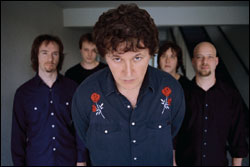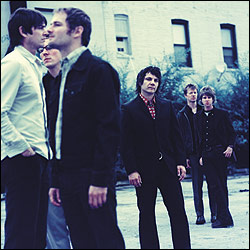GUIDED BY VOICES are the worst band I’ve ever loved.
Actually, maybe they’re my all-time favorite band. I certainly play them enough to qualify. But sweet Jesus, they can be godawful, and that awfulness is so frequent it can’t just be disregarded, the way it sort of can with another Great Band. Dylan or Neil Young fans come to appreciate even their heroes’ “wilderness” periods, but with GBV, the tossed-off B-sides and dry periods don’t abet the packageas often as not, they are the package. Being a fan is very . . . confusing.
It’s weird that I even care. It took me over 10 years to realize that the drummer’s missed cue in “Louie Louie” wasn’t done on purpose, and to this day, I still cannot understand why people think Exile on Main Street sounds murky. But I’m not so forgiving of GBV’s faults.
Maybe because there are so many of themor, perhaps, because they’re so intertwined with the band’s glories. Once I became entranced with GBV’s 1994 underground milestone Bee Thousand, I gradually started buying all their past albums and EPs . . . and no matter what I bought, I felt swindled. Every single time. Sometimes it hardly sounded like rock music at allmore like scrawled notes toward songs, barely first drafts. In contrast, the more professional stuff they recorded after Bee Thousand, which took them from the basement to the Lollapalooza second stage, rehashed classic rock clich鳬 only more static and monochromatic. And everything seemed more or less obviously recorded under drunken circumstances or to suffer from gratuitous over-singing. Or shockingly careless instrumental work. Or lyrics that were incomprehensible prog-rock whimsy. Or full of a seemingly accidental homoeroticism that frankly creeps me outI don’t want frontman Robert Pollard on our fucking team.
Yet without fail, every single GBV recordafter days or weeks or months, through a guitar hook or one of those harebrained Random Surrealism Generator title phraseswould re-emerge in my mind. And the malformed things would eventually resolve themselves into, you know, real records. The dumb little unfinished snippets seemed irritatingly lazy at first but wound up giving the albums shape, preparing the listener for the fuller-bodied songs, pacing the album, sometimes even being perfect on their own. Pollard’s voice could play around in the murk, heroically bellowing over or dejectedly mumbling under it, transformed from sounding pathetic to sounding full of pathos. Occasionally, the murk would reveal itself as irresistible sing-alongs, like voyeuristic peeks into an island nation with its own customs, ideals, and garbled take on the rock canon. Hearing them was like eavesdropping on gnomes as they created entire sci-fi universes from the sound of Paul McCartney’s “Jet”after indie drunks stripped it for parts.
Given that GBV were a band that prided themselves on their fealty to Rock and all its immediacy, it’s funny that I had to learn to hear each record, as if it were Conlon Nancarrow or something. Soon I wouldn’t have to. Pollard, that lovable rockist fool, decided to provide incontestable proof of the indie fallacy that the unproduced moment is more aesthetically stimulating than the produced one. Pollard fired the original band, got a new one (who were actually really grand, especially live, where they were shit-hot in ways the original GBV never were), and started streamlining. Right off the bat, the albums started sounded boring-OK instead of unhinged-beguiling, and they continued to sound boring-OK until I stopped making myself play them.
I made myself play the new Earthquake Glue (Matador), and it’s not rock, not pop, just indie gray water, less a collection of songs than a long sequence of oddly pleasant chord changes. Pollard used to be all over the place vocally, shrugging on and off all manner of vocal styles: bleating Jaggerisms, hung-over grog, lyrical sneer, drunken carnie, new-wave sternness, childlike hush. But on Earthquake Glue, he’s disconcertingly cautious, staying within a slightly higher than normal register, like he’s straining to keep in tune or fight back nerves. It’s tempting to draw a comparison to Madonna when she tries to show that, damn it, she’s a Good Singer, but the end technique is totally different.
Because Guided by Voices are contrary bastards, there are exceptions. “I’ll Replace You With Machines,” unlike anything else on the album, actually has a hook, a smeared, stompy new-wave beat, “Just What I Needed” as a runway anthem. But Pollard generally sounds aggrieved at the loss of the indie-meets-mainstream context that made his band semifamous a decade ago”the business” appears to be the subject of Earthquake Glue‘s less opaque songs. It’s a subject he’s been fixated on since 1996’s perfect Under the Bushes Under the Stars. Given his ridiculous work ratesince 2000, there have been two full-length GBV albums, several EPs, a box set of unreleased material, two solo discs, and 10 side project albums, with even more set for release before the end of 2003Pollard seems ripe for a Mariah Carey-style breakdown. Considering the ramshackle weirdness of his work, it’s impossible to see how it would affect his music. At this point, I’m not certain I’d care either way.








